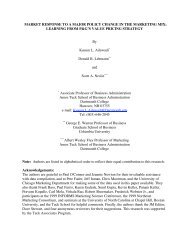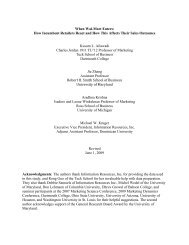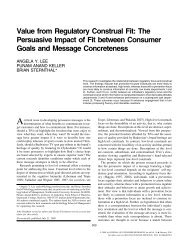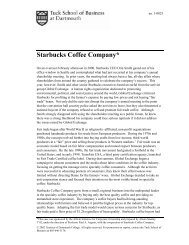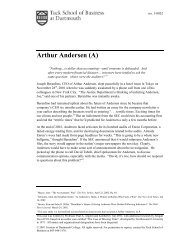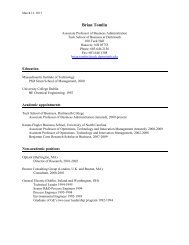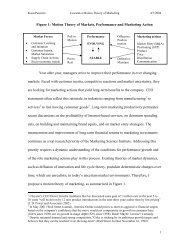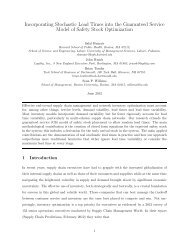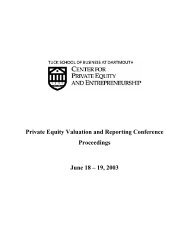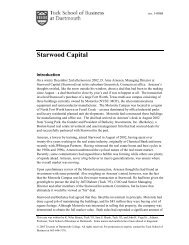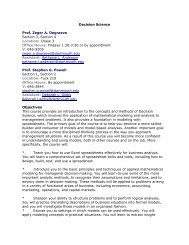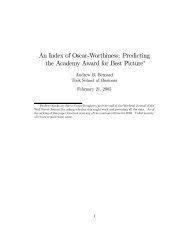tax notes international - Tuck School of Business - Dartmouth College
tax notes international - Tuck School of Business - Dartmouth College
tax notes international - Tuck School of Business - Dartmouth College
You also want an ePaper? Increase the reach of your titles
YUMPU automatically turns print PDFs into web optimized ePapers that Google loves.
PORTUGAL<br />
Extension <strong>of</strong> Portuguese Holding Regime<br />
The proposal would extend the <strong>tax</strong> regime applicable<br />
to Portuguese incorporated holding companies<br />
(Sociedade Gestora de Participações Sociais, or SGPS)<br />
to foreign EU-incorporated entities that move their<br />
statutory seat or place <strong>of</strong> effective management into<br />
Portugal. The objective <strong>of</strong> this amendment is tw<strong>of</strong>old.<br />
First, the measure is designed to eliminate a potential<br />
incompatibility with EU law regarding the nonapplication<br />
<strong>of</strong> this beneficial regime to foreign EU holding<br />
companies effectively managed in Portugal. Second,<br />
the measure aims to stimulate investment and to create<br />
an incentive to transfer capital into the Portuguese territory.<br />
Under the proposal, the more favorable regime for<br />
participation exemption on dividends received and<br />
capital gains realized that is applicable to SGPSs<br />
would apply equally to companies incorporated under<br />
the law <strong>of</strong> another EU member state that have their<br />
statutory seat or place <strong>of</strong> effective management located<br />
within Portuguese territory and that have as their sole<br />
corporate purpose the management <strong>of</strong> participations in<br />
other companies provided the conditions established<br />
for SGPSs under the Portuguese legal framework are<br />
met. 2<br />
Under the current applicable legal framework, the<br />
activities defined as holding activities include only:<br />
mere holding <strong>of</strong> investments in which at least 70 percent<br />
<strong>of</strong> the total investments must be in companies in<br />
which the holding company owns directly or indirectly<br />
a minimum <strong>of</strong> 10 percent <strong>of</strong> the share capital with voting<br />
rights for more than one year 3 ; rendering <strong>of</strong> technical<br />
services and/or management services to companies<br />
in which the holding company holds directly or indirectly<br />
a qualified participation; and lending <strong>of</strong> funds<br />
and providing cash management to subsidiaries and<br />
other qualifying holdings (that is, minimum direct or<br />
indirect holding <strong>of</strong> 10 percent). Also, the holding company<br />
is restricted to acquiring or holding real estate<br />
unless the real estate is used for the premises <strong>of</strong> its<br />
head <strong>of</strong>fice or <strong>of</strong> its subsidiaries.<br />
2<br />
The legal framework <strong>of</strong> SGPSs is contained in Decree Law<br />
495/88 as amended by Decree Law 318/94, Decree Law 378/<br />
98, and Law 109-B/2001. Article 32 <strong>of</strong> the Tax Benefits Statute<br />
incorporates the <strong>tax</strong> regime applicable to SGPSs.<br />
3<br />
The holding company may nonetheless invest in mere passive<br />
holdings (that is, less than 10 percent <strong>of</strong> the voting rights) if:<br />
the amount does not exceed 30 percent <strong>of</strong> the investments made<br />
in other holdings; the value <strong>of</strong> each passive holding is not less<br />
than €5 million; the purchase results from the target company’s<br />
merger or demerger; and the holding company has formalized a<br />
managerial subordination agreement with the target company,<br />
under which the management <strong>of</strong> the subordinated company’s<br />
business activities is entrusted to the holding company.<br />
Other Amendments<br />
The proposal would reduce the minimum amount <strong>of</strong><br />
special advance corporate <strong>tax</strong> payments, which is essentially<br />
meant to function as a minimum <strong>tax</strong>, to<br />
€1,000. The amount <strong>of</strong> the advance corporate <strong>tax</strong> payment<br />
is basically equal to 1 percent <strong>of</strong> annual turnover<br />
capped with a limit <strong>of</strong> €70,000 and payable in two or<br />
three installments.<br />
When VAT return shows a credit balance, the excess<br />
input <strong>tax</strong> may be carried forward or a refund may be<br />
requested if the credit balance during a period <strong>of</strong> 12<br />
calendar months exceeded €250. The bill proposes a<br />
reduction to €3,000 (from the previous €11,250) <strong>of</strong> the<br />
minimum excess input VAT necessary to request a refund<br />
before the 12-month period elapses.<br />
The bill would allow the government to establish a<br />
reverse charge rule for VAT payers covering the supply<br />
<strong>of</strong> goods and services within public procurement contracts<br />
<strong>of</strong> a value equal to or greater than €5,000 when<br />
the acquirer <strong>of</strong> the goods or services is the Portuguese<br />
state or other public entities.<br />
The bill would extend the <strong>tax</strong> credit available<br />
against personal income <strong>tax</strong> for acquisition <strong>of</strong> personal<br />
computers and related equipment to cover expenses<br />
from the acquisition <strong>of</strong> next-generation broadband<br />
equipment. The <strong>tax</strong> credit would remain equal to 50<br />
percent <strong>of</strong> the acquisition costs <strong>of</strong> the <strong>tax</strong>payer with a<br />
limit <strong>of</strong> €250.<br />
Russia<br />
♦ Paulo Núncio and Tiago Cassiano Neves,<br />
Garrigues, Lisbon<br />
Court Dismisses Claim for Back Taxes<br />
Against Ernst & Young<br />
The Moscow Arbitration Court on January 27<br />
quashed a RUB 390 million claim for back <strong>tax</strong>es<br />
against Ernst & Young’s Russian subsidiary, Ernst &<br />
Young Vneshaudit, according to a January 27 report by<br />
RIA Novosti, the state news agency.<br />
Further details on the court’s decision were not<br />
available.<br />
The company had challenged a December 29, 2007,<br />
decision <strong>of</strong> the Moscow Tax Inspectorate ordering it to<br />
pay RUB 390 million in pr<strong>of</strong>its <strong>tax</strong>es, VAT, and fines<br />
and penalties for 2004. The <strong>tax</strong> authorities accused the<br />
company <strong>of</strong> underreporting its 2004 pr<strong>of</strong>its <strong>of</strong> RUB<br />
10.5 million by RUB 630.3 million.<br />
Ernst & Young Vneshaudit had deducted that sum<br />
as expenses for consulting services performed by its<br />
parent company in Cyprus. The authorities said those<br />
406 • FEBRUARY 2, 2009 TAX NOTES INTERNATIONAL<br />
(C) Tax Analysts 2009. All rights reserved. Tax Analysts does not claim copyright in any public domain or third party content.



